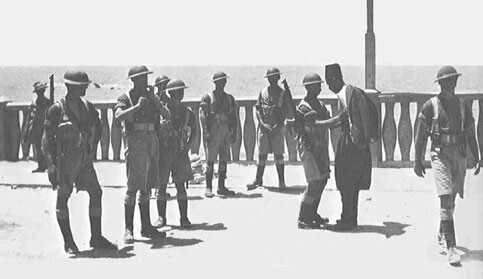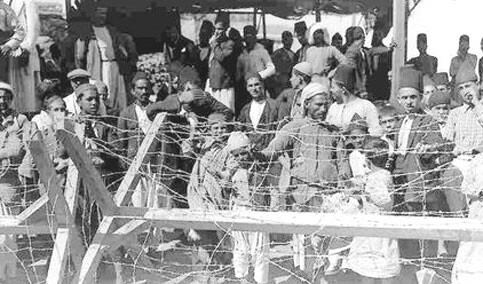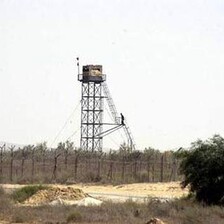Jerusalem 31 October 2003

British soldiers searching residents of Jaffa during the first Palestinian uprising in 1936 (Photo: PalestineRemembered)
Born in Jaffa in 1910, the founder of the Difaa Newspaper (the Defense), Ibrahim Shanti is without doubt one the most important figures in the establishment of Palestinian, Jordanian, and indeed Arab journalism. After graduating with a political science degree from the American University of Beirut in1932, Shanti went back to his home town of Jaffa to be at the forefront of the anti-colonial struggle against the British mandate in Palestine. In 1934 he established Al-Difaa, which not only was for forty years the most important newspaper in Palestine, but also became the only rival to Egyptian newspaper Al-Ahram in the Middle East.
Shanti sought for his paper, as he put it, “to become the newspaper of all Muslims and Arabs, regardless of party or group, with the purpose of fighting colonialism, and its merchants; and to stand in solidarity with independence movements and enslaved nations, to support the worker and the peasant, and to create a respectable and intelligent public opinion.”
Indeed, Shanti’s paper became a central platform for free speech in the Middle East, attracting a number of formidable leaders and intellectuals in the Arab world, from all political stripes, and graduating some of the most important names in journalism in the Arab world such as: Naser Eldin Nashashibi, Ajaj Nuwahed, Mahmoud Abu El-Zuluf, Salim Al-Sharif, Suaad Khouri, Janet Farah, Anbara Al-Khaldi, Yousef Hanna and many others.

Palestinians in Jaffa protesting British colonial policies in 1935 (Photo: PalestineRemembered)
So strong was Al-Difaa’s impact, so resonating was Shanti’s voice in the hearts of tens of thousands of readers across the Arab world, that the British Government not only closed the paper countless times, but also incarcerated its owner and journalists on many occasions. His column Wijdaniant (existentialisms) wherein he often incited Arabs and Muslims to rise up to the challenges before them, was widely acclaimed and awaited, as was his Quick Comments section of the paper, in which he succinctly discussed the important events of the day with wit and wisdom.
Yet, it wasn’t much Shanti’s incitement that the British and Israeli governments feared, as it was his insight.
Highly educated, cultured and fluent in several languages, Shanti enjoyed what at the time was an unmatched talent for rational analysis and an ability to comprehend and prognosticate the magnitude of the predicament befalling not just the Palestinians but the Arab world with Jewish immigration and the creation of Israel. Consider the following prophetic note sounded by Shanti in an editorial in the wake of the adoption of a UN resolution to partition of Palestine on November 29th, 1947:
The partition has been decided in New York. But it will not be implemented in Palestine. This should be a motto for us and our grandchildren. For it is easier for this nation to face this problem before it is implemented, since tomorrow it be futile to resist it. It will be a reality. It will threaten our future with dispossession. Today the Arabs can prevent this evil with the least cost. Tomorrow they will not be able to at all cost. This [new] state will have its allies, its friends, and its supporters. It will have its offensive and defensive weapons, its military and its naval brigades, as well as its interests and greed. Today oh Arabs it is Palestine, and tomorrow it will be your countries, one after another. In that moment, regrets and grief would do you no good. If this state is created there will come a time in which it will control all the Arabs from the ocean to the Gulf. Who will heed this call? Who will defend? ‘And the transgressors shall know to what twist they turn’ [line from the Qura’an].
If only the Arabs listened!
Immediately after its creation in1948, Israel exiled Shanti to Cairo and closed Al-Difaa’s offices in Jaffa. While his exile proved a bitter blow, Shanti was a relentless journalist who would move on to help establish papers in Cairo and Jordan. In 1950 he resigned after a brief stint as the Chairman of the Arab Bank, a post afforded to him by his friend Abdulhamid Shuman, to pursue his passion and reopen Al-Difaa’s doors in Jerusalem. After the occupation of Jerusalem in 1967, with the encouragement of the Jordanian government, Al-Difaa re-located to Amman, where it played a central role in elevating Jordanian journalism, and Shanti would be elected as the first President of the Journalists’ Union. Nonetheless, this prominence would be short lived as the Al-Difaa was permanently closed by orders of then Jordanian Prime Minister, Wasfi El-Tal on May 26th, 1971, as a punishment for an article that offended the government.
So uncompromising was Ibrahim Shanti in his integrity and principles that not only did he decline offers from his friend King Faisal of Saudi Arabia to fully finance the opening of a new paper in Cairo, but he also lost all of his wealth for his eternal passion—journalism. And so it happens that the man, who could have had millions of dollars from the stroke of his pen, would pass away without his family having the means to cover the cost of his funeral.
In a time when most journalists sold their pens or were encapsulated by the little cocoons of dogma, Shanti choose to be a free spirit. Instead of becoming a relic in some king’s court, he became “great legend and giant of Palestinian journalism” as some of his now prominent students describe him
In unearthing the history of this man, we not only discover how deeply we are in need of individuals with his intellect, competence and moral caliber, but also how not much has changed in the Palestinian predicament and the prescriptions required for redress.
A leaflet distributed a month before the appearance of the Difaa in 1934 eloquently outlined its mission as “a calling for a return to the field of struggle with faith and perfection, and to resist the phenomenon of division in the ranks of the people; to nurture the morals of the nation in its current crisis, and to encourage writing about other national liberation struggles; to eradicate the illnesses of arrogance, selfishness, and capturing the lime light on the shoulders of the nation…believing that the individual should serve the collective, rather than the collective serving the individual.”
How much the past looks like the present.


